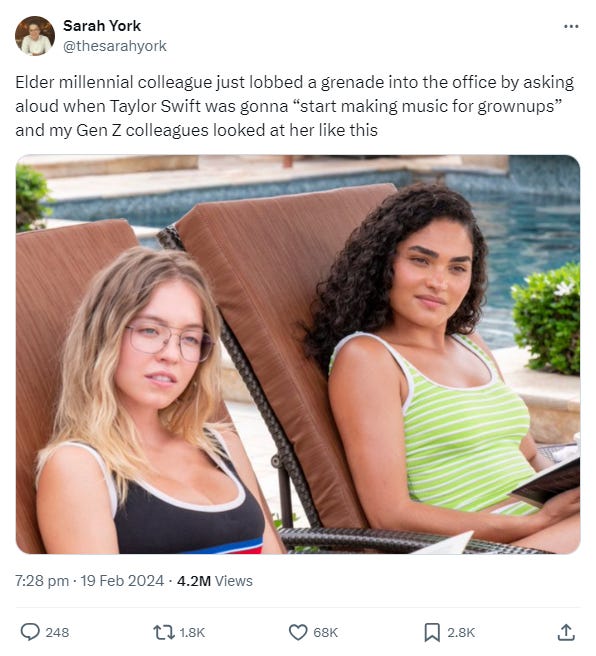Welcome to the latest edition of The Gen Zer. This week, we take a look at Gen Z in the workforce, from why we’re taking more sick days to whether we actually prefer remote working. We also discuss a win for Gen Z activists in South Korea, how Abercrombie has won back young people, and the reasons behind the growing split between young men and women voters. Read on for more . . .
Gen Z is currently the world’s largest generation. We make up 33% of the global population and 40% of consumers, and we’re increasingly entering the workforce. Born between 1997 and 2012, the median Gen Zer is twenty — recently new to the workforce or soon to join it, and, if you believe the headlines, causing a bit of a stir.
As every generation comes of age, they bring with them a host of changes. Culture is a dynamic, ever-influenced thing, and as each generation is shaped by the global, technological, and societal developments taking place during their formative years, they reflect back on that wider culture with a fresh perspective.
When it comes to the workplace, Gen Zers get a fair amount of bad press — sometimes fairly, sometimes unfairly. We’ve been called an ‘employer’s nightmare’ and this week there have even been a number of articles declaring that we’re losing the ability to type, having spent too much time on touch screens. TikToks of Gen Zers reacting to the realities of the working world have gone viral, with some offering support and others deriding the generation as a whole for being workshy.
Another headline — one that is more based on statistics than anecdotes — is that Gen Zers are taking more sick days than previous generations. In the past few years sick leave across all age groups has increased, with this trend most notable for young workers: a 29% increase for under 35s since 2019, compared to a 16% increase for over 35s, according to Dayforce.
There are a wide range of factors responsible for this shift. The pandemic is obviously a big factor, both with more people actually getting sick and — a longer term impact — more awareness about the risks of infecting others. Commuting into the office with a sore throat wasn’t seen as a big deal back in 2019, but now there’s more hesitancy about it. For Gen Z, we spent several formative years being told to stay at home rather than risking the health of the vulnerable and elderly, so perhaps it’s not too surprising that we’re now staying at home more when feeling ill.
Another factor is to do with mental health, both the increase in mental health conditions like depression and anxiety amongst young people, and an increased focus on taking care of yourself. There’s a lot less stigma around protecting a work-life balance for yourself nowadays, and as young workers become increasingly burned out and anxious, ‘mental health days’ are becoming more of a norm, with many firms offering a number of them throughout the year — along with things like subscriptions to Headspace or even free therapy sessions.
In a similar vein, there’s been a renewed focus recently on the right to switch off, i.e. the right to ignore work out of hours, such as with checking emails. In the UK, the Labour government are set to enact the right to switch off into law, and Australia have just introduced a similar rule.
One reason why this is now such a focal issue is to do with the rise of hybrid working. Having a mixture of office days and remote working has become the norm since the pandemic, and for the most part Gen Zers (like everyone else) like the flexibility that this offers. Many of us entered the workforce during or after the pandemic, and so it’s all we’ve ever known in our working lives. However, this shift has also brought a blurring in the separation between work and home. Go back a few decades and there would be no way for you to see any new emails or carry on working once you’d left the office. Now, we’re always switched on — and this isn’t just a problem for Gen Zers, either.
Interestingly, Generation Z is actually the age group who are least fond of some aspects of hybrid working. According to a report by Seramount, only 11% of Gen Z workers want to be fully remote, compared to 34% from the older generations, and there’s growing evidence that the high number of online calls (as opposed to face-to-face meetings) is contributing to burnout for young people.
Although we think of Gen Z as digital natives, we arguably have much more to gain by going into the office than workers from older age brackets. Your early career is when things like mentorship, networking, new opportunities and new experiences matter the most, and these things are all so much easier and likelier to happen if you’re in the office. If you’re thirty-five with young kids, settled in your career with a good work-from-home setup, then there’s little incentive to go into the office more. If you’re twenty-one and just moved into a dingy sublet in a new city, going into the office, seeing your colleagues, and learning from older colleagues has a lot more appeal.
Of course, whilst Gen Zers might desire more office interaction, there have been some headlines about their rejection of work drinks culture. (You might even say that Gen Z is healthy and boring.) There has been a wider shift towards drinking less for young people, in part because of a greater focus on health as well as the ongoing cost of living. Another reason is simply that there’s less stigma around not drinking; nowadays you’re less likely to be seen as unambitious in your career for not drinking with your bosses — so those who don’t want to, don’t.
Some Gen Zers are even rejecting the office altogether, along with traditional career paths. Most Gen Zers on the internet now describe themselves as video content creators. The number of influencers has massively increased over the past 5 years, as has the creator economy in general. That’s not to say that these Gen Zers are all leaving their jobs; many are simply taking up a side hustle, in part to cope with the aforementioned rising cost of living. A survey by Kantar showed that 40% of Gen Z workers have at least two roles, with things like trading crypto or growing a social media brand occupying young people’s after hours. And some, of course, are taking remote working opportunities to become digital nomads, saving money on rent and seeing the world whilst they work.
There’s a general sense that the boundaries are getting increasingly blurred, and that old formalities and rigid career paths have become more informalised and flexible. We’re even changing the way people communicate at work, too.
So, are Gen Z workers workshy, difficult and demanding? Maybe a little bit. Perhaps we do have slightly different standards to previous generations, given the very different world we’ve grown up in.
As for the complaints about Gen Z workers having it easier . . . well, complaining about the youth of today is nothing new. There were similar complaints in the 1920s and ‘30s when the six day working week changed to the five days we’re now familiar with. Some saw it as a sign that the newer generations were becoming lazy and entitled. After all, if previous generations worked 100 hour weeks without complaining, then why couldn’t they?
In 1930, the economist John Maynard Keynes wrote a now-famous essay called Economic Possibilities for Our Grandchildren, in which he predicted that since productivity was set to massively increase over the next century, we’d likely end up with a 15-hour working week. After all, he mused, with the advent of advanced technologies it would become increasingly easy to meet basic needs, so society would instead shift its focus from economic pursuits to cultural and creative ones instead. We haven’t quite got there, despite the accuracy of Keynes’ claims about increased productivity, and yet if Gen Z workers do want a slightly better work-life balance, if we want the occasional mental health day and a more flexible office atmosphere, then, well, why not?
Gen Z around the Web
the latest stories in youth culture and changing trends . . .
UK 15-year-olds are bottom of European satisfaction league (the guardian)
A quarter of British teenagers report low life satisfaction, compared with 7% of their Dutch peers. Overall, UK teenagers have the lowest life satisfaction in Europe, with many of the respondents citing pressure from school, mental health issues, and social media as the core reasons. Read more
Young South Korean activists win climate case against their government (thred.)
254 local activists, many of whom were teenagers when they filed the lawsuit, have won a case against their government on the grounds that their current climate goals are ‘unconstitutional.’ The government has now been ordered by the Constitutional Court to ramp up its environmental policies, more specifically to provide greater details on how it aims to reach its 2049 climate goals. Read more
The gender gap among Gen Z voters, explained (ny times)
It’s no secret that young men and women are drifting apart politically, with men becoming more conservative and women becoming more progressive. Claire Cain Miller of the NY Times spoke with eight young women supporting Harris and eight young men backing Trump to try and understand why. Read more
The stunning, subdued resurrection of Abercrombie & Fitch (vox)
For young people a decade ago, Abercrombie meant flashy designs and topless male models in-store. After a fair amount of controversy, not to mention struggling sales, the brand is back and absolutely booming — it’s even beating Nvidia, with a share price that’s climbed 245% in the past year. An embrace of inclusivity, modern designs, and a more subdued, mature look are all behind the resurrection. Read more
Gen Z are spending loads on beauty, but why? (the guardian)
Despite being financially conscious in many areas, young people are splurging on beauty products, treating them as an essential rather than a luxury. In some ways, this is less to do with looks and more to do with mental well-being, self-expression, as well as things like the millions of influencers advertising beauty products all over social media. Read more
That’s all for this week! Make sure to subscribe for the latest on Gen Z and youth culture, and check out The Common Thred for a weekly roundup of the latest news, trends and thought pieces.
See ya soon,










As you mentioned, every noteworthy generation of people has demanded radical changes in their society. Gen Z, in particular, has pushed existing boundaries in so many areas (human rights, desire for personal freedoms/individuality, + care for the environment to name a few) so it's easy to look at their approach and behaviours at work and immediately label them as problematic, when they're simply different. In the end though, future generations will thank Gen Z for setting these new precedents in the workplace! Amazing piece, Jeremy! x
ps. headline image is fire